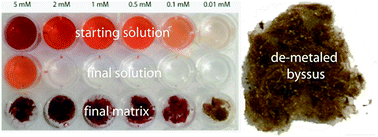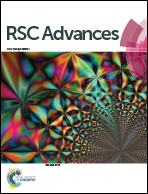Exploitation of mussel byssus mariculture waste as a water remediation material†
Abstract
Dye pollution represents an important environmental concern, especially from textile industries in the South of Asia. On the other hand, biomass accumulation derived from mussel processing in alimentary industries is also an environmental problem. In this research, these two environmental issues are addressed by proposing the reuse of mussel's protein anchoring threads, the byssus, as disposable material for dye water removal. The byssus was selected as substrate because it contains a distinctive variety of functional groups that can be exploited for diverse chemical interactions. This material was utilized in its native metaled state and in the de-metaled one, in order to study how the chemical state of the functional groups influences the adsorption properties of both anionic and cationic aromatic dyes. The results of comparative experiments of adsorption showed a higher uptake in the native metaled byssus for a model cationic dye, methylene blue, while the de-metaled byssus showed a higher uptake for a model anionic dye, Eosin Y. These results are considered in light of different uptake mechanisms, supported by the analyses of isotherm model parameters, in which diverse functional groups are involved as a function of substrate and dye chemical states.



 Please wait while we load your content...
Please wait while we load your content...